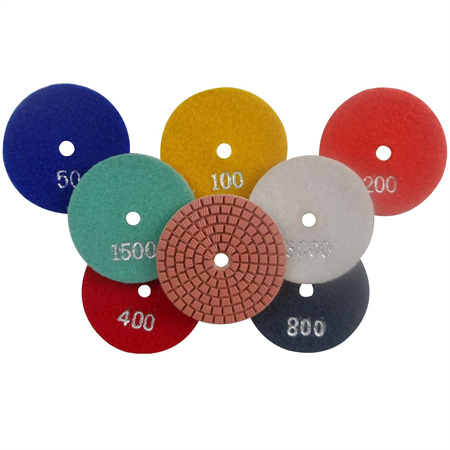Title: Chemical Resistance in Diamond Polishing Pads
In the realm of diamond polishing pads, one characteristic stands out as particularly crucial: chemical resistance. As an industry leader in diamond polishing pad manufacturing based in China, we understand that the longevity and efficiency of our products are paramount to our clients. Whether you’re an importer, wholesaler, or retailer, the quality of diamond polishing pads can greatly impact your operations. This article delves into why chemical resistance is vital in diamond polishing pads and how it benefits various applications in the industry.

Chemical resistance refers to the ability of a material to withstand chemical reactions and degradation when exposed to different substances. For diamond polishing pads, this quality is essential because these pads often come into contact with a range of chemicals during the polishing process. This includes not only abrasives and solvents but also various cleaners and conditioners that might be used to enhance the polishing process.
Why Chemical Resistance Matters
Diamond polishing pads are designed to polish and finish surfaces with precision. However, during this process, they are exposed to chemicals that can cause wear and tear if the pads are not resistant. Pads that lack chemical resistance can break down quickly, leading to reduced efficiency and the need for frequent replacements. This not only increases operational costs but can also affect the quality of the finished product.
Benefits of Chemical Resistance in Diamond Polishing Pads
1. Enhanced Durability: Pads with high chemical resistance are less likely to degrade when exposed to harsh chemicals. This increased durability translates into longer-lasting products that can handle extended use without compromising performance.
2. Consistent Performance: Chemical-resistant pads maintain their effectiveness over time. This ensures that the polishing process remains consistent, producing high-quality finishes and reducing the risk of defects in the final product.
3. Cost Efficiency: While chemical-resistant pads might come with a higher upfront cost, their longer lifespan and reduced need for frequent replacements make them a more cost-effective option in the long run.
4. Reduced Maintenance: Pads that resist chemical damage require less maintenance. This means less downtime and more efficient operations, which is crucial for businesses that rely on continuous polishing processes.
Applications of Diamond Polishing Pads
Diamond polishing pads are used across various industries, each requiring specific properties and performance levels from their pads. Here’s a look at some of the key applications:
1. Stone and Concrete Polishing: In the stone and concrete industries, polishing pads need to be highly durable and resistant to both abrasion and chemicals. These pads are used to achieve a high-gloss finish on surfaces like granite, marble, and concrete.
2. Automotive Detailing: For automotive detailing, pads must resist chemicals found in car care products, such as waxes and polishes. High chemical resistance ensures that the pads remain effective and do not degrade under these conditions.
3. Glass Polishing: When polishing glass, the pads encounter different chemicals, including cleaning agents. Pads with superior chemical resistance are essential for maintaining the clarity and smoothness of glass surfaces.
4. Metal Finishing: In metal finishing, polishing pads are exposed to a variety of corrosive substances. Chemical resistance is crucial to prevent the pads from deteriorating and to ensure a consistent finish.
Choosing the Right Diamond Polishing Pad
When selecting diamond polishing pads, it’s important to consider their chemical resistance along with other factors such as grit size, pad thickness, and bonding. Pads with enhanced chemical resistance are often designed with advanced materials and coatings that help them withstand aggressive substances without compromising their performance.
For businesses involved in wholesale and retail, understanding the specifications of diamond polishing pads and their resistance to chemicals can be a significant advantage. This knowledge enables you to provide better products and solutions to your customers, enhancing your reputation in the market.
Conclusion
In the competitive world of diamond polishing pad manufacturing, chemical resistance is a defining factor that can significantly impact the quality and efficiency of polishing processes. As a leading manufacturer based in China, we prioritize the development of diamond polishing pads that offer superior chemical resistance, ensuring our clients receive products that are durable, efficient, and cost-effective.
For importers, wholesalers, and retailers, choosing diamond polishing pads with high chemical resistance not only benefits your operations but also improves the satisfaction of your end-users. By investing in quality pads that can withstand harsh chemicals, you’re investing in the long-term success and reliability of your polishing processes.
If you’re looking for top-notch diamond polishing pads that deliver outstanding performance and durability, our products are designed to meet and exceed industry standards. Explore our range and discover the difference that high chemical resistance can make in your polishing applications.